Pulitzer Prize-Winner James B. Stewart '73 Examines Moral and Political Education
April 7, 2003
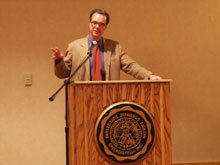 April 7, 2003, Greencastle, Ind. —
April 7, 2003, Greencastle, Ind. — ![]() [DOWNLOAD VIDEO: "A Better Future" 279KB] "We must embrace notions of moral and political education, and not shy from them," said Pulitzer Prize-winning journalist and author and 1973 DePauw University graduate James B. Stewart as he addressed the national symposium, "Political Education and the Modern University" at DePauw this afternoon. Stewart's most recent book, Heart of a Soldier: A Story of Love, Heroism, and September 11th, provided a backdrop for his talk. The book tells the story of Rick Rescorla, who headed security for Morgan Stanley in the World Trade Center, and is credited with saving countless lives in the frantic minutes after terrorists flew hijacked planes into the twin towers. Rescorla himself died while rescuing others.
[DOWNLOAD VIDEO: "A Better Future" 279KB] "We must embrace notions of moral and political education, and not shy from them," said Pulitzer Prize-winning journalist and author and 1973 DePauw University graduate James B. Stewart as he addressed the national symposium, "Political Education and the Modern University" at DePauw this afternoon. Stewart's most recent book, Heart of a Soldier: A Story of Love, Heroism, and September 11th, provided a backdrop for his talk. The book tells the story of Rick Rescorla, who headed security for Morgan Stanley in the World Trade Center, and is credited with saving countless lives in the frantic minutes after terrorists flew hijacked planes into the twin towers. Rescorla himself died while rescuing others.
"My telling of the Rescorla story, first in the New Yorker and then much expanded in my book, took some readers by surprise since much of my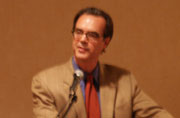 best-known work focuses on scandal, corruption, personal greed, featuring characters who are the anthithesis of Rick Rescorla or a Dan Hill [Rescorla's best friend]," Stewart noted. The author of best-selling books such as Den of Thieves (which examined the insider trading scandals of the 1980's), Blind Eye (about a doctor who killed patients and was even convicted of poisoning colleagues but continued to practice) and Blood Sport (on the Clinton White House and Whitewater), Stewart is best known for shedding light on improper, immoral and illegal activities.
best-known work focuses on scandal, corruption, personal greed, featuring characters who are the anthithesis of Rick Rescorla or a Dan Hill [Rescorla's best friend]," Stewart noted. The author of best-selling books such as Den of Thieves (which examined the insider trading scandals of the 1980's), Blind Eye (about a doctor who killed patients and was even convicted of poisoning colleagues but continued to practice) and Blood Sport (on the Clinton White House and Whitewater), Stewart is best known for shedding light on improper, immoral and illegal activities. ![]() [DOWNLOAD AUDIO: "Critical Moments" 67KB] "And yet all of these works focus on critical moments of moral decision making in which people face a clearly defined choice between self-interest and the interests of a broader community," Stewart noted.
[DOWNLOAD AUDIO: "Critical Moments" 67KB] "And yet all of these works focus on critical moments of moral decision making in which people face a clearly defined choice between self-interest and the interests of a broader community," Stewart noted.
The author finds it interesting that "many of those ensnared 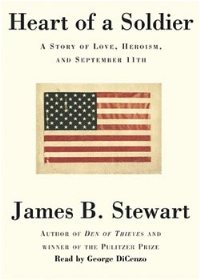 by scandal not only occupied highly-paid positions carrying immense prestige, but they boasted glittering academic résumés," while Rescorla was not a person of privilege and did not receive a college degree until later in life. Stewart says that among almost all of the "Wall Street felons," as he called them,
by scandal not only occupied highly-paid positions carrying immense prestige, but they boasted glittering academic résumés," while Rescorla was not a person of privilege and did not receive a college degree until later in life. Stewart says that among almost all of the "Wall Street felons," as he called them, ![]() [DOWNLOAD AUDIO: "Way Station" 156KB] "their educations seemed little more than another notch on the belt of success, a way station to high-paying, powerful jobs that, in turn, led to greater wealth and influence. Indeed, for the most part they exhibited a disdain for colleagues who were actually sidetracked by the substance of their educations and were particularly contemptuous of academics, including their own professors, even as they assiduously courted and flattered them in their quest for high marks."
[DOWNLOAD AUDIO: "Way Station" 156KB] "their educations seemed little more than another notch on the belt of success, a way station to high-paying, powerful jobs that, in turn, led to greater wealth and influence. Indeed, for the most part they exhibited a disdain for colleagues who were actually sidetracked by the substance of their educations and were particularly contemptuous of academics, including their own professors, even as they assiduously courted and flattered them in their quest for high marks."
Rick Rescorla, on the other hand, was largely self-taught. He prided himself on reading the works of great authors, quoted Shakespeare, and was particularly enamored with Rudyard Kipling's The Man Who Would Be King, which Stewart says, tells a story that Rescorla identified with, and in many ways, lived. It is a tale of British heroism, and Rescorla had worked for British military intelligence and fought in Cyprus. On September 11, 2001, Rescorla safely evacuated 2,700 employees from Morgan Stanley's offices in the south tower of the World Trade Center, then went back into the building to search for stragglers. His body was never found.
![]() [DOWNLOAD AUDIO: "Duty Over Self-Interest" 232KB] "Such
[DOWNLOAD AUDIO: "Duty Over Self-Interest" 232KB] "Such 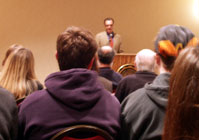 stories, now as in centuries past, handed down from one generation to another, are the underpinnings of community," Stewart told the audience that gathered in the Student Social Center of Walden Inn. "This is not simply because they tell the story of a hero, someone who embraces duty over self-interest. It is because the hero's act of selflessness, in and of itself, is both born out of and transcends the wickedness, depravity and indifference to suffering that would otherwise make life intolerable. I think Rescorla knew this: knew that if he died it would be in a moment that would honor all of those characters, real and fictional, he so admired and that had shaped his life."
stories, now as in centuries past, handed down from one generation to another, are the underpinnings of community," Stewart told the audience that gathered in the Student Social Center of Walden Inn. "This is not simply because they tell the story of a hero, someone who embraces duty over self-interest. It is because the hero's act of selflessness, in and of itself, is both born out of and transcends the wickedness, depravity and indifference to suffering that would otherwise make life intolerable. I think Rescorla knew this: knew that if he died it would be in a moment that would honor all of those characters, real and fictional, he so admired and that had shaped his life."
The former front page editor of the Wall Street Journal (where he received a Pulitzer Prize for articles on the 1987 stock market crash and the insider-trading scandal) and current editor-at-large of SmartMoney magazine and reporter-at-large for the New Yorker, Stewart suggested that the decline of both the narrative and heroic figures in recent literature is troubling and "rooted in the collapse of so many shared values." He concluded, ![]() [DOWNLOAD AUDIO: "Defining Our Potential" 291KB] "In stark contrast to the wrongdoers I have so often written about,
[DOWNLOAD AUDIO: "Defining Our Potential" 291KB] "In stark contrast to the wrongdoers I have so often written about, 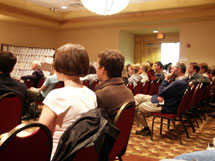 what he and Hill absorbed from their wide readings was never removed from their identities, something to adorn their résumé. It had become the essence of who they were. As writers and educators, we could hardly hope for more. How do we achieve this? I think it is a mistake to place too much weight in measuring educational outcomes. I'm a fervent believer in a liberal arts education, however acquired. Its seeds will take root, or not, and grow in ways we may not be able to foresee. Yet I know that in some it will eventually yield those moments that transcend individual lives and define both our potential as human beings and our notions of community."
what he and Hill absorbed from their wide readings was never removed from their identities, something to adorn their résumé. It had become the essence of who they were. As writers and educators, we could hardly hope for more. How do we achieve this? I think it is a mistake to place too much weight in measuring educational outcomes. I'm a fervent believer in a liberal arts education, however acquired. Its seeds will take root, or not, and grow in ways we may not be able to foresee. Yet I know that in some it will eventually yield those moments that transcend individual lives and define both our potential as human beings and our notions of community."
Heart of a Soldier was named "Best Non-fiction Book of 2002" by TIME magazine. You can read more about it here, here and here.
The symposium, "Political Education and the Modern University", which is supported by a grant from the Mellon Foundation, continues through Saturday. For a complete schedule of events, click here.
